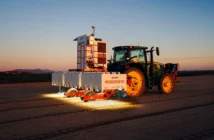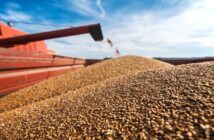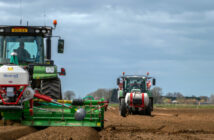The differences between arable farming in North East Scotland and Lincolnshire were highlighted at the recent Scottish Agronomy conference in Perth, where two-time FW Arable Farmer of the Year, Andrew Ward and the current holder of the award, Scott Campbell both reported having made significant changes to their management systems over the last five or six years to improve margins and beating blackgrass.
Andrew Ward, who last spoke at the conference in 2013, said that he had been forced to make changes due to the problem of blackgrass on his 650 ha in Lincolnshire.
He said, “In 2011,12 and 13 I was concerned that yields were dropping and costs increasing. Since I started the blackgrass programme, this has reversed and I have reduced my herbicide costs in winter wheat to £65 per ha from £110.”
Ward explained that one head of blackgrass contains 500 seeds, one plant has 20 to 30 tillers, and therefore it is massively prolific. He said: “Our worst case scenario has been wheat yielding less than two tonne per hectare, which is not worth harvesting.”
His control methods have included growing more spring crops, spraying the worst affected areas with glyphosate and hand-rogueing. He said, “Our hand rogueing costs have been as high as £30,000 per year but our herbicide bill has reduced and we are definitely getting on top of the problem now.
“The cost of chemically treating blackgrass on an average farm in my area, with no assurance of effectiveness, would be £222/ha. I spent £143/ha last year on a combination of glyphosate and hand rogueing, but my control has been 99% effective.”
He added that despite his inputs being up, his cost of production per tonne of winter wheat has reduced from £119 in 2013 to £108 in 2019 thanks to increased yields.
The changes made by Scott Campell involved upgrading an out-dated farming system on the 415 ha at Kirkton of Kinellar Farm at Garrioch.
He spoke about the beneficial effects of changing to liquid fertiliser, and that he is achieving better coverage on headlands, increasing yields in these areas by 30 per cent. Using farmyard manure from a neighbour in a straw for muck deal, has also saved him £25 per hectare on fertiliser in the last three years.
Campbell has also switched to using minimal cultivations where possible by investing in a Horsch Pronto drill which has reduced his fuel usage by 50 per cent. One of his biggest changes however, has been to the rotation, which now includes a green manure crop with winter wheat, winter and spring barley and oilseed rape.
He said: “I find the benefits of the green manure crop are numerous; it dries up the field, fixes nitrogen, adds organic matter and is a great entry for early wheat. I believe I am saving up to 20 per cent on purchased fertiliser and yields have improved because soil health is better.”
Campbells’ inputs for winter wheat, including sprays, nutrition and machinery costs are £835 per hectare but with the advantage of increased yields to an average 9.8 tonnes per hectare, this brings his costs down to £84.82 per tonne.
He has also spread the risk by growing several different varieties of each of his cereals to suit different fields/soil types and for different markets. He also pays particular attention to marketing now, having invested in storage capacity, which allows him to sell crops to his advantage.




